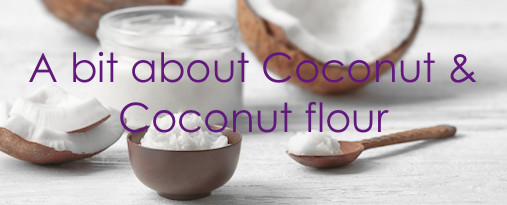Todays post is all about Coconut and Coconut flour.
Coconut is such a versatile food and available in several different forms. It is becoming increasingly popular in many different diets due to its many health benefits. I use it in many of the recipes shared on this blog – Choc-Orange Slice, Orange & Coconut Cake, Spiced Pumpkin Muffins, Brownies,
First, what is Coconut?
Botanically speaking, a coconut is a fibrous one-seeded drupe. However, when using loose definitions, the coconut can be all three: a fruit, a nut, and a seed.
Coconut is a seed because it is the reproductive part of the tree. However, coconut is also a fruit because it is a fibrous one-seeded drupe. Finally, coconut is a nut because a loose definition of a nut is nothing but a one-seeded ‘fruit’.
It’s all a bit botanically confusing I think.
It’s very versatile.
Coconuts are used for many things ranging from food to cosmetics. Coconuts are distinct from other fruits because of the large quantity of clear liquid, “coconut water” or “coconut juice” contained inside.
The coconut flesh can be eaten straight from the shell. It is also dried and shredded, toasted or not. The oil and milk derived from it are commonly used in cooking as well as in soaps and cosmetics.
It has many health benefits
As a food, as it’s incredibly rich in vitamins, minerals, and fibre.
Lauric acid is the most important saturated fat provided by coconuts. It lowers the level of bad cholesterol (LDL) in the body and helps keep your arteries clean and healthy.
The liquid or water is not only a delicious and refreshing drink, it is also rich in electrolytes, enzymes, and minerals. Cytokinin, one of the elements found in coconut water, possesses potent anti-carcinogenic and anti-aging properties.
What is Coconut flour?
Dehydrating and finely grinding the coconut flesh after the oil has been extracted, creates the flour. With a slightly sweet, coconut flavour, coconut flour has a fine texture and can be used to substitute plain flour.
Coconut flour can be used to replace up to 1/3 of plain wheat flour in baking recipes, however about an equal amount of extra liquid will also be needed.
Coconut flour provides medium-chain triglycerides (MCTs) and plant-based iron.
MCTs are a type of fat linked to several benefits, such as weight loss, protection against bacteria and viruses, and enhanced brain and heart health.
Coconut flour also contains high levels of fibre, which may help keep blood sugar levels in check. Foods rich in fiber help regulate blood sugar levels by slowing down the speed at which sugar enters your bloodstream.
Additionally, coconut flour contains small amounts of soluble and other fermentable fibres, which feed the beneficial bacteria in your gut. The combination of fibre may also benefit your digestion. (Sources – http://www.coconutresearchcenter.org/, https://www.healthline.com, https://www.medicalnewstoday.com )
So, try adding a bit of coconut to your cooking. Whether it is desiccated, milk, oil or flour, will have some form of health benefit.
It also tastes nice.
Till the next post,
Live clean n prosper.

